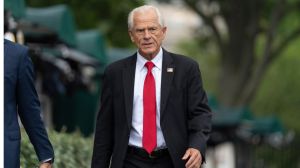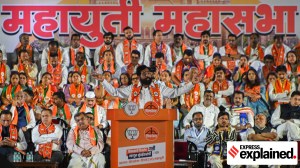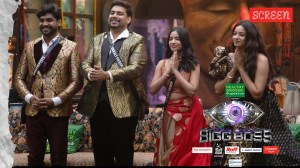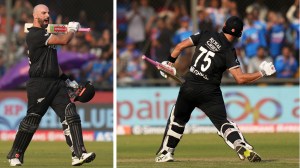A wrong list from Sonia
Sonia Gandhi exhibited a ruthlessness reminiscent of Indira Gandhi in her selection of members for the Rajya Sabha. Barring Arjun Singh an...

Sonia Gandhi exhibited a ruthlessness reminiscent of Indira Gandhi in her selection of members for the Rajya Sabha. Barring Arjun Singh and Hansraj Bhardwaj, who won because of the insistence of Satish Sharma, she axed all other heavyweights.
Indira Gandhi was adept at getting her way and neutralising senior leaders. But if Kamlapati Tripathi, sitting on her right at the meeting of the Central Parliamentary Board, whispered in her ear, quot;Isko dekh leejiyequot;, she would either pay heed or bring him to her point of view. If R. Venkatraman opposed Thangka Balu8217;s nomination for the upper house, suggested by G.K. Moopanar, she would make sure that she spoke to Venkatraman, giving him the feeling that his views were given their due before she went ahead.
Sonia Gandhi tried to call people to her room after she had denied them tickets. She called on Sitaram Kesri after she had decided not to renominate him.
Had she given a ticket to Kesri, or even to P.V. Narasimha Rao, it would have added to her stature. Today there is no threat to her leadership. But the Congress party needs stalwarts to take on the government in the upper house in the weeks and months to come on policy issues. But Sonia chose to eliminate them all, for little-known figures or non-political personalities.If Sonia Gandhi wanted to bypass senior leaders as part of some plan, surely she could have chosen better known names, after adequate homework. In the last hours before nominations closed, party leaders were seen as-king MPs in the Central Hall of Parliament for names of SC leaders who could be nominated.
If it was social engineering which dictated her choice there are six SCs in a list of 18 8212; again the Congress party could surely have found better known SC candidates. In that case, it made little sense to deny the likes of Hanumanthappa, a Dalit, or Shiv Shankar, an OBC, nomination. This was after all an election to the Rajya Sabha, a Council of Elders, where experience, stature and expertise should count.
What social message does the nomination of Inder Khosla send in UP where elections are due next year? Without a revival in UP and Bihar, the Congress cannot be a player in Delhi and that is a hard fact of political life. In the past the strength of the Congress was that it reflected the plurality of India, and was a coalition of various interests. This did not mean that in the finalisation of tickets the party did not take into account regional, linguistic or ethnic factors. Caste was al- ways a major consideration but it was rarely talked about. The party preferred to cover it with an ideological garb and tried to strike a balance between communities. This time the party went overboard in giving these niceties a go by.
The denial of Rajya Sabha nominations to candidates who have lost in a Lok Sabha election is a ridiculous principle. It was stupid when Arjun Singh was denied a ticket. It is equally counter-productive now. The party fielded many hundreds of its best leaders in the Lok Sabha election. Then it put up many more in the assembly elections. Exclusion of all these names naturally limits the choice of a party. Little wonder that it had to bring in the likes of Dilip Kumar, Dasarinarayan Rao, R.P. Goenka, who have little to do with politics.
A Lok Sabha election is decided by a variety of factors. A.B. Vajpayee had lost to Madhavrao Scindia in the 1984 elections after Indira Gandhi8217;s assassination. But surely that could not be a reason acirc;euro;ldquo;and was not acirc;euro;ldquo; for denying him a place in the Rajya Sabha. The BJP did not make Sushma Swaraj8217;s defeat in Bellary an excuse to deny her a ticket, even though there was resistance to her name from one section of the party. The BJP8217;s political objectives determined its nominees. In contrast, the Congress list smacks of an apolitical approach. It may have enabled those enjoying a proximity to her to further their objectives, but it makes little sense from Sonia8217;s point of view.
Since she is comparatively new to politics process, Sonia Gandhi needs a wide range of inputs into her decision-making. This is something she encouraged all through 1998. But come March 1999, she began to rely only on a handful of people. It led to her abortive attempt to form a government last year. That is why her need to put the system in place, like the Central Parliamentary Board, which also makes for collective responsibility when things go wrong, is that much more than that of, say, Narasimha Rao, who dispensed with the CPB.
There are rumblings of discontent in the Congress today. There is a growing opinion within the party that Sonia still does not understand the nuances of Indian politics.
- 01
- 02
- 03
- 04
- 05































